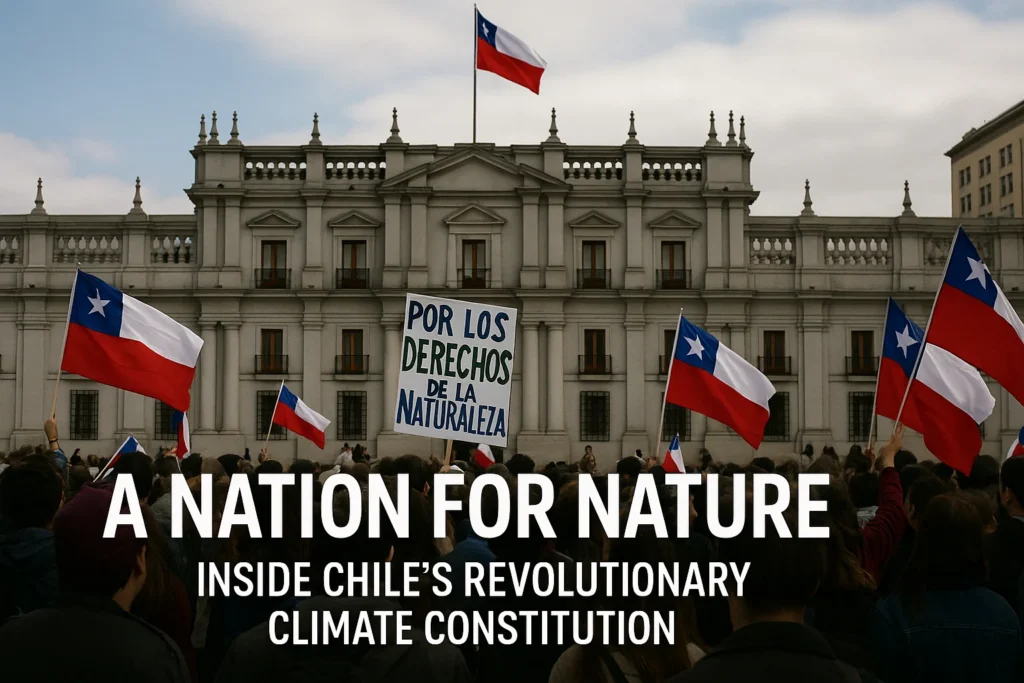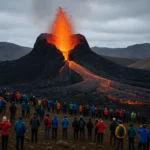The Night Chile Rewrote Its Future
On December 17, 2024, the streets of Santiago erupted in celebration. Fireworks lit up the sky as thousands danced under banners reading “La Tierra Gana” (“The Earth Wins”). After years of protests, negotiations, and rewrites, Chile had just become the first country in history to adopt a constitution that placed environmental protection at its core—granting legal rights to nature, mandating carbon neutrality, and dismantling decades of unchecked industrial exploitation.
For environmental lawyer Pilar Moraga, who helped draft the document, the moment was surreal. “This wasn’t just about updating laws,” she said, watching the crowds from her balcony. “It was about redefining Chile’s soul.”
But how did a nation known for copper mines and neoliberal policies become the testing ground for ecological democracy? And can it actually work?
The Perfect Storm: Why Chile Led the Way
1. A Country on the Climate Frontlines
Chile’s geography makes it a living climate laboratory:
- The Atacama Desert, once the world’s driest place, now sees sporadic floods.
- Glaciers in Patagonia are retreating faster than scientists predicted.
- Megafires have torched entire neighborhoods on the outskirts of Santiago.
“People here don’t debate climate change—they live it,” says Dr. Laura Gallardo, a climatologist at the University of Chile.
2. The 2019 Social Explosion
What began as student protests over subway fares spiraled into a nationwide uprising against inequality. One demand rose above all: “No más zonas de sacrificio!” (“No more sacrifice zones!”)—referring to industrial areas where communities suffered pollution for corporate profit.
3. A Once-in-a-Generation Rewrite
When Chile voted to scrap its Pinochet-era constitution in 2020, activists saw an opening. “We didn’t just want to remove dictatorship-era laws,” says Camila Zárate, a 32-year-old eco-feminist delegate. “We wanted to build something revolutionary.”
Inside the World’s Greenest Constitution
🌿 Nature as a Legal Person
The most radical provision grants ecosystems the same rights as humans:
- Rivers can sue polluters.
- Forests must be protected from deforestation.
- Mining projects now face lawsuits from the land itself.
First Test Case: In March 2025, the Maipo River—vital to Santiago’s water supply—was granted legal standing to block a controversial dam.
⚡ The Carbon Neutrality Mandate
Unlike non-binding climate pledges, Chile’s targets are court-enforced:
- 2030: 40% emissions cut (vs. 2020 levels)
- 2040: 70% renewable energy grid
- 2050: Net-zero—or the government gets sued.
To get there:
- Ban on new coal plants (existing ones must close by 2030).
- Carbon tax on beef, flights, and gasoline.
- Rewilding law requiring 1 million hectares of restored land by 2035.
💧 Water as a Human Right
Chile was the only country with fully privatized water—until now. The new rules:
- Corporations lose automatic water rights.
- Indigenous communities gain veto power over projects.
- “Water crimes” (like hoarding during droughts) carry prison time.
Impact: Lithium mines in the Atacama, which guzzle freshwater, must now recycle 90% of their water or shut down.
🏛️ New Institutions to Enforce It
- Climate Courts: Judges trained in ecology, not just law.
- Earth Ombudsman: Investigates violations on behalf of nature.
- Citizen Watchdogs: Locals can sue over environmental harm.
The Backlash: Who’s Fighting Back?
1. The Mining Giants
Chile supplies 28% of the world’s copper. Companies warn of:
- Job losses (mining employs 8% of Chileans).
- Economic chaos if projects get blocked.
Their Move: Lobbying for exemptions—so far, unsuccessfully.
2. The “Green Colonialism” Critique
Some Indigenous groups argue the constitution doesn’t go far enough:
- “They gave nature rights but not land back,” says Mapuche leader Elisa Loncón.
- Others fear eco-gentrification, where green policies price out locals.
3. The Implementation Nightmare
- Who speaks for a river? Courts are still figuring it out.
- How to punish “ecocide”? Fines? Prison?
- Can a poor country afford this? Chile’s GDP relies on mining.
Global Ripple Effects
1. The Legal Blueprint
- Colombia and Brazil are drafting similar reforms.
- Europe cites Chile in debates over rights for glaciers.
- California activists are pushing for a “Chile-style” water law.
2. The Economic Shockwaves
- Copper prices spiked as mines face new restrictions.
- Clean tech booms: Chile’s solar capacity tripled in 2025.
- Investor panic: Fossil fuel stocks plunged post-ratification.
3. The Cultural Shift
- “Eco-Constitutionalism” is now a university major.
- Kids sue parents for wasting water (yes, really).
- Tourists flock to see “the world’s first green democracy.”
Voices From the Ground
The Former Miner
“I spent 20 years digging copper. Now I’m training to install solar panels. It’s scary, but necessary.”
— Luis Gutiérrez, 48, Antofagasta
The Climate Judge
“My first case? A glacier sued a ski resort for melting it. We ruled for the glacier.”
— Judge Marcela Fernández, Santiago Climate Court
The Teen Activist
“We grew up breathing toxic air. This constitution is our revenge.”
— Ana Fuentes, 17, Valparaíso
The Road Ahead: Make or Break?
2025-2030: The Decisive Decade
- 2026: Last coal plant closes.
- 2027: Beef consumption taxed.
- 2028: First “climate refugees” resettled.
- 2029: National park expansion (10% of Chile’s land).
- 2030: Carbon neutrality deadline looms.
The Big Question
Can Chile prove that ecology and economy can coexist? Or will backlash derail the experiment?
What This Means for the World
For Travelers
- New eco-taxes fund conservation.
- Carbon-neutral tours to Patagonia.
For Investors
- Green bonds are booming.
- Copper mines now face strict ESG rules.
For Activists
- A playbook for constitutional fights.
- Proof that radical change is possible.
The Bottom Line
Chile’s gamble is more than policy—it’s a new philosophy of governance. As one farmer in the Elqui Valley put it: “Before, the law said nature belonged to us. Now it says we belong to nature.”
The world is watching. If Chile succeeds, it could redefine what it means to be a nation in the climate era. If it fails? The consequences—for Chile and the planet—could be dire.




9s6rat